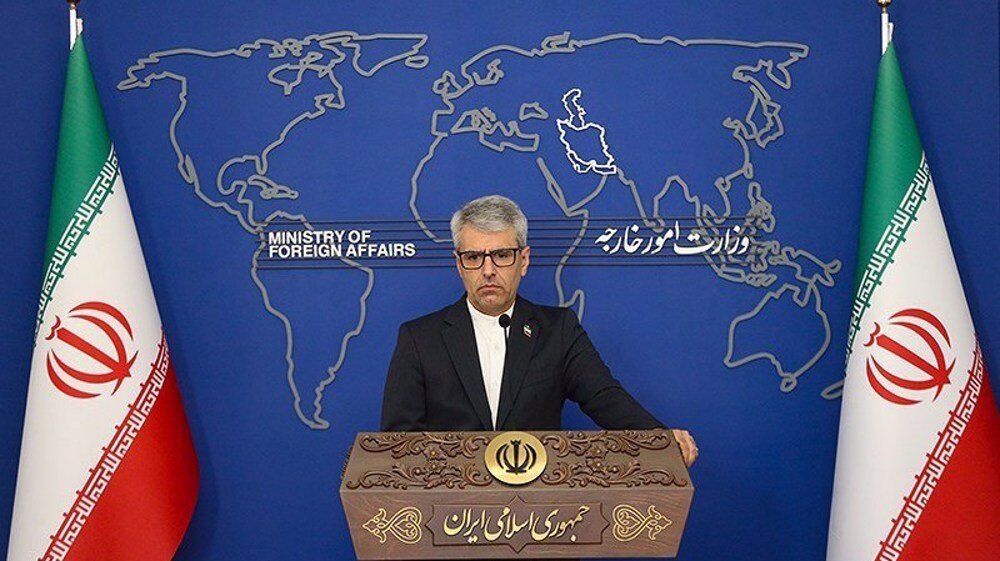'We will not beg for talks', says Iran's foreign ministry spokesperson

TEHRAN – Iran’s Foreign Ministry spokesman Esmaeil Baqaei said Iran “never begs for negotiations,” emphasizing that any dialogue must serve the country’s national interests and preserve its dignity.
Speaking at his weekly press briefing in Tehran on Monday, Baqaei addressed a wide range of issues, from the latest developments surrounding the JCPOA and Iran’s diplomatic efforts in New York to the humanitarian crisis in Gaza and regional relations.
Responding to reports about events in New York, Baqaei said talks “are a two-way process that must be based on assessing mutual interests,” adding that “protecting national interests is just as important as safeguarding national authority.”
He explained that before Iran’s delegation left for New York, IAEA Director General Rafael Grossi had proposed joint meetings involving the United States to prevent further escalation over sanctions. “We did not oppose the idea and showed goodwill,” Baqaei said, “but the other parties were not ready. On three separate occasions, when such a meeting was proposed, it was they who avoided holding it. We only held bilateral meetings with the Europeans—and that is the reality.”
Commenting on Deputy Foreign Minister Abbas Araghchi’s remarks about Iran’s proposals in New York, Baqaei said the Iranian delegation made every effort to stop the illegal move by the three European countries.
“Iran went to New York with an initiative. The Europeans accepted our proposals three times but apparently failed to persuade the American side,” he said.
“This proves that the new U.S. administration’s announcement on restoring sanctions became the directive guiding the Europeans, who ignored all of our proposals.”
He added that while Iran made every reasonable effort toward a logical solution, “the other sides either lacked the will or the ability to reach one.”
‘Nations should refrain from aligning with sanctions’
Baqaei described Turkey’s reported alignment with the snapback sanctions as “unnecessary and unlawful.”
“Our request to friendly nations is to refrain from contributing to the effects of an illegal decision,” he said, noting that none of the entities named under the sanctions held assets in Turkey.
He also confirmed that Iran’s Atomic Energy Organization stated that “no accounts have been frozen.”
‘Europe abused the JCPOA mechanism’
Baqaei accused the three European countries of “irresponsible and destructive behavior,” saying they “abused the so-called snapback mechanism” under the JCPOA.
He said the Europeans misused the dispute resolution process “to impose U.S. demands,” setting “three illogical conditions.”
Despite this, Iran decided to cooperate with the IAEA “within the framework of safeguard obligations.”
He explained that Tehran and the IAEA had reached an understanding to establish a new framework for cooperation, which was initially welcomed by both the Agency and the Europeans, “but later, they backtracked.”
He added that the Europeans eventually demanded Iran engage in direct dialogue with the U.S.—a condition Tehran rejected.
‘IAEA report opened the way for Western misuse’
Baqaei said Iran holds the United States and the Zionist regime responsible for attacks on its nuclear facilities but criticized the IAEA for “creating an opening” that allowed Western powers to misuse the situation.
“The Agency should have condemned the Zionist regime and the United States for such actions,” he said. “We hope recent developments will serve as a lesson for all parties, including the IAEA, to exercise greater precision.”
Referring to Araghchi’s meeting with UN Secretary-General António Guterres, Baqaei said Tehran presented detailed legal arguments proving the illegality of the Europeans’ move.
“At least two permanent Security Council members have objected,” he said, “showing there is no consensus.”
He stressed that the European action “creates no legal obligation for other countries” and urged states “to refrain from following the illegal decision.”
‘No plans for talks with Europe’
Baqaei dismissed claims that diplomatic channels remain open, saying: “At present, we have no plans for negotiations with Europe. Our focus is on assessing the implications and consequences of their illegal actions and those of the United States.”
Baqaei said Tehran plans to file a formal complaint against the three European states.
“Their action lacks justification even by the standards of six Security Council members who refused to support them,” he said.
“Iran fully complied with the JCPOA until 2019 and only reduced commitments in response to U.S. withdrawal and European noncompliance. None of the four parties had any legal standing to invoke the dispute resolution mechanism.”
He also criticized Washington for “boasting about criminal acts,” saying this “only increases America’s legal culpability.”
‘No active IAEA inspections in Iran’
Asked about IAEA inspections, Baqaei said: “There are currently no active inspections in Iran. The last ones were about ten days ago at the Bushehr Nuclear Power Plant under our agreement with Russia.”
He added that any future steps would be decided by the Supreme National Security Council.
‘Efforts underway to free detainees in France’
On the detention of Iranian national Mahdieh Esfandiari in France, Baqaei said: “Her arrest is illegal, and no legitimate justification has been presented.”
He confirmed that Iran’s ambassador in Paris has met her three times and that the Foreign Ministry continues to pursue the case, along with efforts concerning two French nationals detained in Iran.
‘Syria’s future lies with its people’
Reaffirming Iran’s position on Syria, Baqaei said: “Syria’s territorial integrity and unity must be respected. Its future must be decided by its own people, not through foreign interference.”
